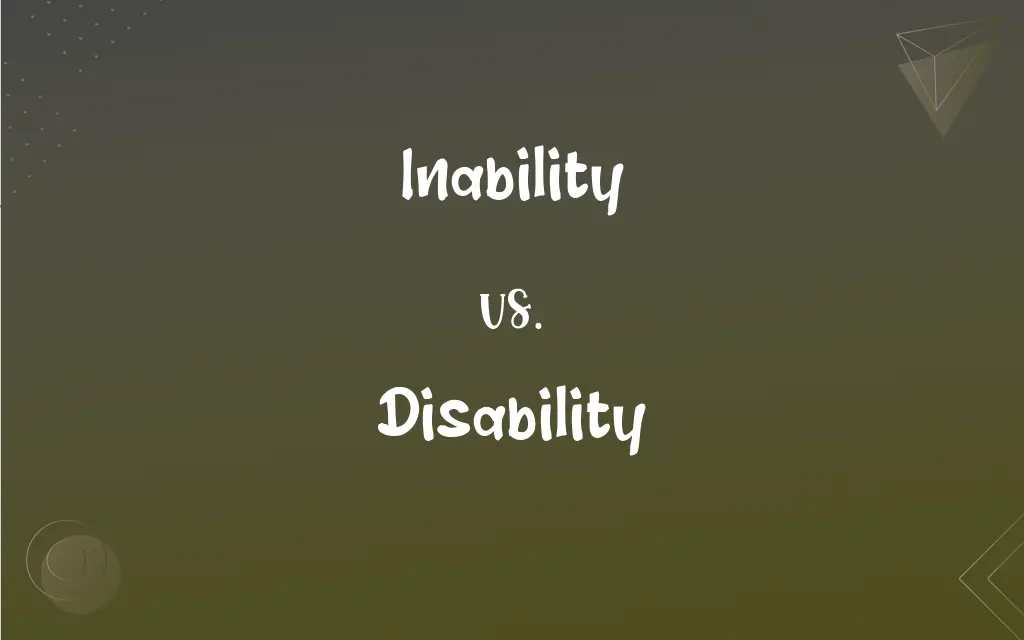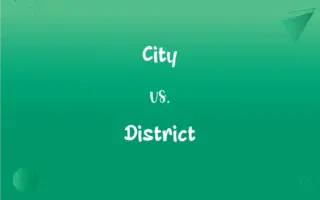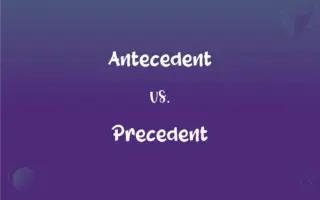Inability vs. Disability: What's the Difference?
Edited by Aimie Carlson || By Janet White || Updated on November 11, 2023
"Inability" refers to the lack of capacity, skill, or means to do something, whereas "disability" is a physical or mental condition that limits a person's movements, senses, or activities.

Key Differences
Inability is a general term that denotes the lack of ability, power, or aptitude to perform a task or function. Disability, on the other hand, specifically refers to a physical or mental impairment that significantly restricts one or more major life activities.
Inability can apply to anyone regardless of their health or physical condition and can be temporary or situational. Whereas, disability typically implies a long-term or permanent condition that impacts a person's daily life and functioning.
The concept of inability is broad and can encompass anything from not having a particular skill, like inability to swim, to lacking the means, like financial inability. While, disability is often recognized in a legal and medical context, with specific criteria and implications for accessibility and accommodation.
While inability can be overcome with training, resources, or time, disabilities often require adaptive strategies, tools, or systemic changes to address the challenges they present.
Inability refers to a more temporary or specific lack of capacity, while disability denotes a more enduring, substantial limitation on a person’s abilities, often requiring societal recognition and support.
ADVERTISEMENT
Comparison Chart
Definition
Lack of skill, capacity, or means
Physical or mental condition limiting abilities
Scope
Broad, can be temporary or situational
Long-term or permanent, often clinically recognized
Context
General, in various situations
Legal, medical, and social contexts
Overcoming
Possible through training, resources
Often requires accommodations, adaptive strategies
Examples
Inability to speak a language
Disability like blindness or deafness
ADVERTISEMENT
Inability and Disability Definitions
Inability
Absence of necessary means.
Her inability to afford the trip saddened her.
Disability
A mental condition affecting functioning.
He received support at work for his learning disability.
Inability
Not having the legal or official power.
His inability to sign the document delayed the process.
Disability
A legally recognized limitation.
Her visual disability qualified her for special services.
Inability
Lack of skill to do something.
His inability to cook made him order takeout often.
Disability
A physical impairment that limits activities.
The ramp was built to accommodate her disability.
Inability
Lack of physical or mental capability.
The test highlighted his inability to concentrate for long periods.
Disability
A condition that restricts everyday life.
Accessibility is crucial for people with disabilities.
Inability
Lack of knowledge or understanding.
The student's inability to grasp the concept concerned the teacher.
Disability
A long-term health issue affecting ability.
Disability insurance provides support for those who cannot work.
Inability
Lack of ability or means.
Disability
A physical or mental condition that significantly limits a person's motor, sensory, or cognitive abilities.
Inability
Lack of the ability to do something; incapability.
Disability
The state of having such a condition
Discrimination based on disability.
Inability
Lack of the option to do something; powerlessness.
Inability
The quality or state of being unable; lack of ability; lack of sufficient power, strength, resources, or capacity.
It is not from an inability to discover what they ought to do, that men err in practice.
Inability
Lack of ability (especially mental ability) to do something
Inability
Lacking the power to perform
FAQs
How is disability defined?
A physical or mental impairment that limits activities.
Is disability always permanent?
Often, but some disabilities can be temporary.
What does inability mean?
The lack of capacity or skill to do something.
Can training overcome inability?
Yes, in many cases.
Can children have disabilities?
Yes, disabilities can occur at any age.
Are all disabilities visible?
No, many disabilities are invisible or not immediately apparent.
Can inability be due to lack of experience?
Yes, inexperience can cause inability.
Does inability affect self-esteem?
It can, especially if it impedes personal goals.
Can inability be temporary?
Yes, it can be situational or temporary.
Does inability require accommodations?
Not usually, it's often overcome with skill development.
What are examples of disabilities?
Conditions like blindness, deafness, or autism.
Are disabilities always inherited?
No, they can be acquired or developmental.
Do disabilities require legal recognition?
Legal recognition can help in accessing services and accommodations.
Can inability lead to disability?
Not directly; they are distinct concepts.
Is inability a medical condition?
No, it's not classified as a medical condition.
Does inability impact daily life?
It can, depending on the context and severity.
How is disability viewed legally?
As a condition that may entitle one to certain rights and protections.
How are disabilities accommodated in workplaces?
Through modifications, support, and adaptive strategies.
Is inability always physical?
No, it can be mental, physical, financial, or legal.
Can disabilities be mental?
Yes, mental health issues can be disabilities.
About Author
Written by
Janet WhiteJanet White has been an esteemed writer and blogger for Difference Wiki. Holding a Master's degree in Science and Medical Journalism from the prestigious Boston University, she has consistently demonstrated her expertise and passion for her field. When she's not immersed in her work, Janet relishes her time exercising, delving into a good book, and cherishing moments with friends and family.
Edited by
Aimie CarlsonAimie Carlson, holding a master's degree in English literature, is a fervent English language enthusiast. She lends her writing talents to Difference Wiki, a prominent website that specializes in comparisons, offering readers insightful analyses that both captivate and inform.
































































